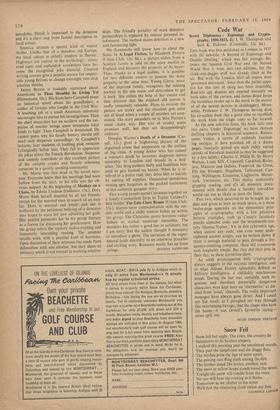Code War
Secret Diplomacy : Espionage and Crypto-
graphy, 1500-1815. By J. W. Thompson and Saul K. Padover. (Constable, 52s. 6d.) THIS book was first published in London in 1937 with the sub-title 'A Record of Espionage and Double Dealing,' which was fair enough. Be- tween the Spanish Civil War and the Second World War it went into two editions, for the cloak-and-dagger stuff was already thick in the air. But with the London blitz all copies were `presumed destroyed.' Since then the public appe- tite for this sort of thing has been insatiable,. Real-life spy dramas are enacted annually on both sides of the curtain, and James Bond keeps the breathless reader up to the mark in the matter of all the newest devices in skulduggery. Mean- while, Professor J. W. Thompson having died, his co-author finds this a good time to republish the work from the single copy so far located.
As the new sub-title hints, the book falls into two parts. Under 'Espionage' we have thirteen thrilling chapters in historical sequence. Renais- sance, Venice, a centre of endlessly fascinat- ing intrigue, is here polished off in a dozen pages. Similarly potted are such richly varied chunks of historical material as may be suggested by a few labels: Charles V, Philip II, Sir Henry Walton, Louis XIV, Cromwell, Cardinals Riche- lieu, Mazarin and Dubois, Frederick the Great, Pitt the Younger, Napoleon, Talleyrand, Can- ning, Wellington, Casanova, Cagliostro, Metter- nich, Vorontzov, etc. This makes undeniably gripping reading, and it's all minutely docu- mented with details that a Sunday sub-editor would cut out as likely to bore the Dales.
Part two, which deserved to be brought up to date and given at least as much space, is a mere twelve-page appendix on the elementary prin- ciples of cryptography, with a few primitive historic examples, such as Caesar's fatuously puerile alphabet code, and the seventeenth-cen- tury 'Queens Sypher.' Yet in this cybernetic age, when almost any code, and even some unde- ciphered ancient scripts, can be broken down if there is enough material to pass through a fre- quency-counting computer, these old crosswords look laughably simple. But they did their jobs in their day, as these narratives show.
An adult preoccupation with cryptography always suggests to the rational intelligence, and to what Aldous Huxley splendidly defined as Military Intelligence, a childishly mischievous streak. During the last war, certainly, such in- genious and therefore potentially dangerous characters were kept busy on 'alternative,' as dis- tinct from 'usual,' channels. The really important messages have always gone direct. And I could not but recall, as I ploughed my way through this entertaining farrago, that the chaps who have the beans—it was Orwell's favourite saying— never spill 'em.


































 Previous page
Previous page